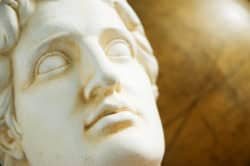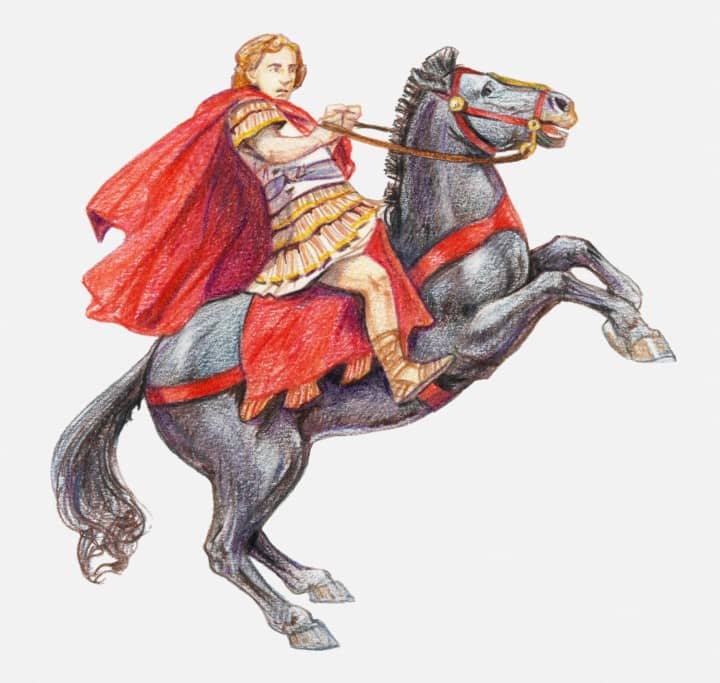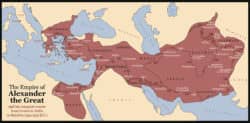 Alexander the Great, officially called Alexander III of Macedon, is one of the most prominent historical figures in Ancient Greek history. In fact, he is as much a part of pop culture here in the United States as he is in Greece.
Alexander the Great, officially called Alexander III of Macedon, is one of the most prominent historical figures in Ancient Greek history. In fact, he is as much a part of pop culture here in the United States as he is in Greece.
Most of us understand that he was a powerful leader who expanded the reach of Ancient Greece far into the East. However, that’s only a small part of his story. In fact, his role in Ancient Greek history is an interesting one. People often see him as a conqueror, but others also acknowledge that he also unified Greece. He also spread the Greek influence all the way through the East and into India.
Here is an overview of who Alexander was and what he truly accomplished:
Alexander’s Early Life
Alexander lived in Macedon while his father, King Philip II, ruled as king. King Philip had multiple wives but it was his fourth, Olympias, who birthed Alexander. From a young age, King Philip knew that he wanted to groom Alexander so that he could be a great king. He had all the best tutors and he also learned military strategy and trained to be an effective soldier.
As mentioned above, he had the best education his dad could secure for him. Up until the age of sixteen he was tutored by Aristotle, who was one of the greatest philosophers in Ancient Greece. Philip hand selected Aristotle after considering other candidates.

Philip had a vision of uniting Greece and invading Persia. After Alexander was finished with his tutor, Philip made sure that Alexander not only understood this vision but also got practical experience.
When Alexander was sixteen years old, the Thracian Maedi revolted against the Macedonians while Philip was away. Alexander squashed the revolt. King Philip began to include Alexander in more and more of his military campaigns.
Crowning a New King of Macedon
Philip was assassinated in 336 BC while attending a wedding. Alexander was only twenty years old but he had already had a lot of military experience, which made it easier for him to follow his father’s footsteps. The nobility acknowledged Alexander as the rightful heir and he inherited the throne shortly after.
The first thing Alexander did was to get rid anyone who posed a threat to his reign as king. Rivals for the throne such as his cousin, Amyntas IV, and two other princes from Macedon, were executed. His throne now secure, he could now focus on being the King.
Philip’s death also caused some unrest amongst the people, particularly those in Thrace, Thebes, Thessaly, and Athens. Rather than let the revolts continue, Alexander sent troops to stabilize the regions and handle the unrest.
Becoming Alexander the Conqueror
One of the things Alexander is best known for is how he moved his army towards the East. At the time, his army numbered over 40,000 and in addition to making his way towards Persia and beyond, he had to react to the general unrest throughout Greece.
In other words, his goal was to conquer both the Greek city-states and also other surrounding countries. His father started the process of conquering the city-states and Alexander simply picked up where he left off. Once Greece was secured, he began to move East.

Alexander Conquers the East and Invades Persia
In 334 B.C., Alexander officially invaded Persia. It took three years but at the age of twenty-five, he was successful. He had other campaigns while conquering Persia. For example, he conquered Egypt and founded Alexandria during that time. Eventually, he pushed even further east and spread the Hellenic influence even further.
Essentially, Alexander set out to continue the work that Philip began. He not only envisioned a Greece that was united, but he also had his sights set on conquering Persia. His plans were halted with his assassination. Philip never had a chance to see that his vision was realized.
Though he was a great conqueror, Alexander’s greatest legacy was spreading Hellenism into the Far East.

